An adverb is a part of speech that modifies or describes a verb, adjective, or another adverb. It often provides information about how, when, where, or to what degree something is done. Adverbs can answer questions such as “how,” “when,” “where,” “why,” and “to what extent.”
Adverbs of Manner
Adverbs of manner are words that describe how an action is performed. They provide more information about the way something happens. Many adverbs of manner end in “-ly,” but there are exceptions.
Examples of Adverbs of Manner:
- She spoke softly.
- He completed the puzzle carefully.
- The dog wagged its tail happily.
- The children played noisily in the backyard.
- The chef prepared the dish expertly.
- The wind blew gently through the trees.
- He solved the math problem quickly.
- The car moved slowly through the traffic.
- She sang the song beautifully.
- The athlete ran effortlessly across the finish line.
- The professor explained the concept clearly.
- The baby slept peacefully in the crib.
Formation of Adverb Manners
The formation of adverbs of manner can vary, but one common way to form them is by adding the suffix “-ly” to adjectives. Here are the basic rules for forming adverbs of manner:
- Adjectives ending in “-ic”:
- Adjective: dramatic
- Adverb: dramatically
- Adjectives ending in “-al”:
- Adjective: natural
- Adverb: Naturally
- Adjectives ending in “-ly”:
- Adjective: friendly
- Adverb: friendly
- Adjectives ending in “-le”:
- Adjective: gentle
- Adverb: gently
- Adjectives ending in “-y” (replace “y” with “i”):
- Adjective: happy
- Adverb: happily
- Adjectives ending in “-ic” (replace “ic” with “ically”):
- Adjective: specific
- Adverb: specifically
- Irregular forms (do not follow a specific pattern):
- Adjective: good
- Adverb: well
- Adjective: fast
- Adverb: fast
- Adjective: hard
- Adverb: hard
- Exceptions (no change):
- Adjective: late
- Adverb: late
- Adjective: early
- Adverb: early
Examples:
- Adjective: Quick
- Adverb: quickly
- Adjective: Careful
- Adverb: Carefully
- Adjective: loud
- Adverb: loudly
- Adjective: beautiful
- Adverb: beautifully
Rules for the Placement of Adverb Manner
The placement of adverbs of manner in a sentence depends on the structure of the sentence and what you want to emphasize. Here are the common rules for the placement of adverbs of manner:
- After the Verb:
- Most commonly, adverbs of manner are placed after the main verb.
Example: She spoke loudly.
Example: They danced gracefully.
- After the Object:
- If there is a direct object in the sentence, the adverb can be placed after the object.
Example: He played the piano beautifully.
Example: She wore the dress elegantly.
- At the End of a Sentence:
-
- If the sentence has no object, the adverb can be placed at the end of the sentence.
Example: She sang the song passionately.
Example: He completed the task quickly.
- Splitting Verb and Object:
-
- In some cases, the adverb can be placed between the verb and its object.
Example: She spoke softly the words of comfort.
Example: He played skillfully the guitar.
- With Modal Verbs:
- When using modal verbs (can, will, should, etc.), the adverb of manner usually follows the modal verb.
Example: He can play the guitar well.
Example: She should speak more clearly.
- With Verb Be:
- When the verb “be” is used, the adverb usually comes after it.
Example: The cat is sleeping peacefully.
Example: The children are playing happily.
Intensity of Adverb Manner
Adverbs of manner can be modified by words that express intensity or degree, adding more nuance to how an action is performed. These words are often referred to as intensifiers or adverbs of degree.
Here are some examples:
- Very: She sang very beautifully.
- The adverb “very” intensifies the manner in which she sang.
- Too: He spoke too softly.
- The adverb “too” suggests an excessive degree of softness in the speech.
- So: They danced so gracefully.
- The adverb “so” emphasizes the high degree of gracefulness in their dancing.
- Extremely: The water is extremely hot.
- The adverb “extremely” intensifies the degree of hotness in the water.
- Quite: The movie was quite interesting.
- The adverb “quite” adds a moderate level of interest to the movie.
- Rather: She finished the race rather quickly.
- The adverb “rather” indicates a moderately high speed in finishing the race.
Avoid Redundancy of Adverbs of Manner
When using adverbs of manner, it’s important to avoid redundancy or unnecessary repetition. Redundancy occurs when the adverb of manner adds little or no meaning because it’s already clear from the verb. Here are some examples of redundancy and how to avoid it:
- Redundant: She whispered quietly.
- (Whispering already implies a quiet manner.)
- Avoid Redundancy: She whispered.
- Redundant: He shouted loudly.
- (Shouting inherently involves a loud manner.)
- Avoid Redundancy: He shouted.
- Redundant: They danced gracefully across the stage.
- (Dancing implies a graceful manner.)
- Avoid Redundancy: They danced across the stage.
List Of Adverbs of Manners
List of adverbs of manner, including both regular forms and irregular ones:
- Quickly
- Slowly
- Gracefully
- Loudly
- Softly
- Carefully
- Lovingly
- Briskly
- Efficiently
- Beautifully
- Patiently
- Cheerfully
- Steadily
- Angrily
- Happily
- Politely
- Noisily
- Quietly
- Expertly
- Cautiously
- Freely
- Suddenly
- Eagerly
- Seriously
- Curiously
- Warmly
- Boldly
- Effortlessly
- Generously
- Tenderly
- Wisely
- Wearily
- Enthusiastically
- Gently
- Firmly
- Vigorously
- Safely
- Well
- Hard
- Fast
- Late
- Early
- Terribly
- Badly
- Best
- Easily
- Far
- High
- Low
- Near
Exercises
Exercise 1: Fill in the blanks with the appropriate adverb of manner.
- She sang the song __________.
- They completed the task __________.
- The cat moved __________ through the grass.
- He spoke __________ during the interview.
- The children played __________ in the yard.
Answer to Exercise 1:
- She sang the song beautifully.
- They completed the task efficiently.
- The cat moved gracefully through the grass.
- He spoke clearly during the interview.
- The children played noisily in the yard.
Exercise 2: Rewrite the sentences by placing the adverb of manner in a different position.
- The chef cooked the meal skillfully.
- She danced gracefully at the party.
- He typed the report quickly.
- They solved the puzzle easily.
- The baby slept peacefully in the crib.
Answer to Exercise 2:
- Skillfully, the chef cooked the meal.
- At the party, she danced gracefully.
- Quickly, he typed the report.
- Easily, they solved the puzzle.
- In the crib, the baby slept peacefully.
You May Also Like

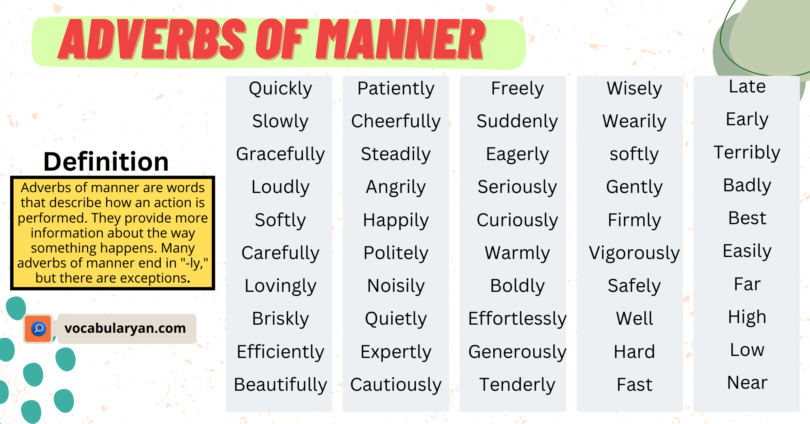
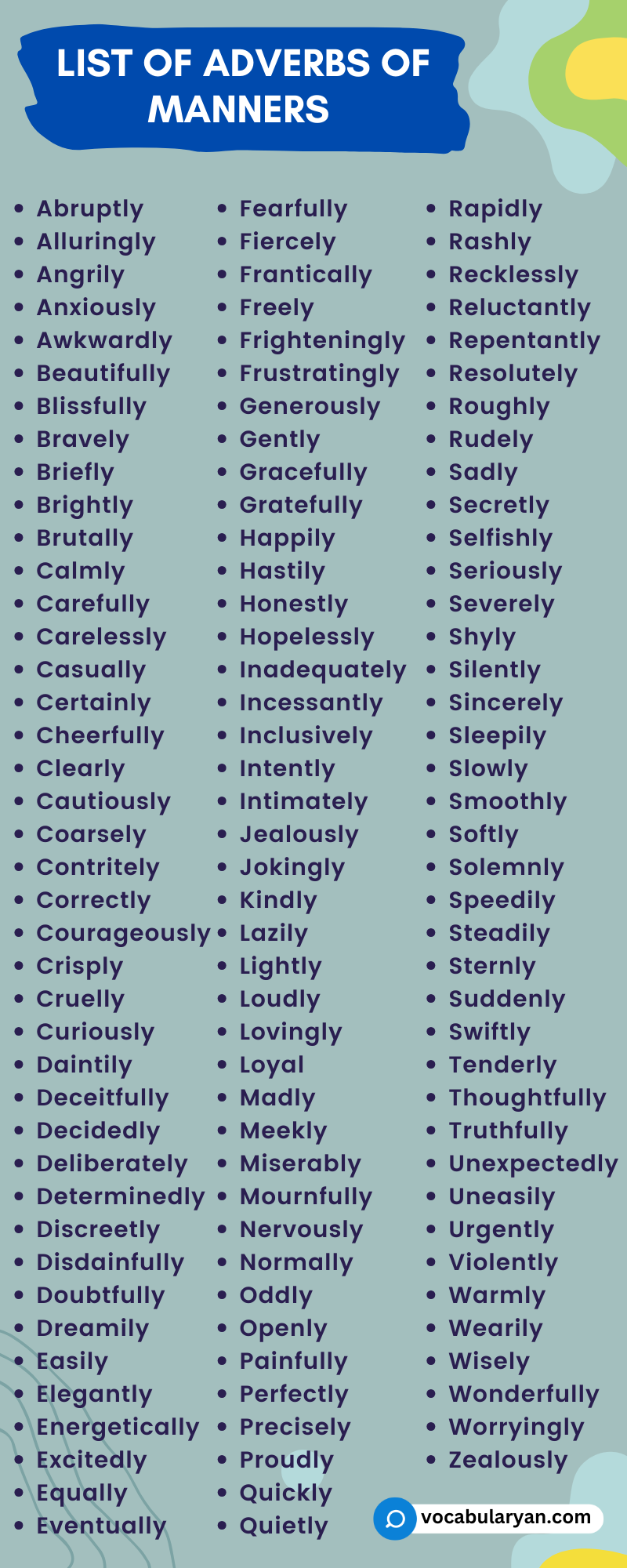
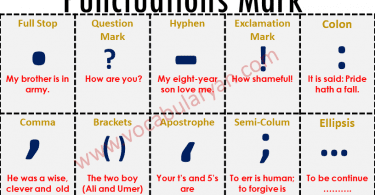
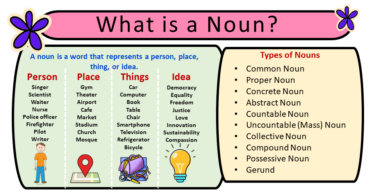

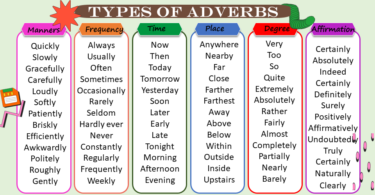
Leave a Comment